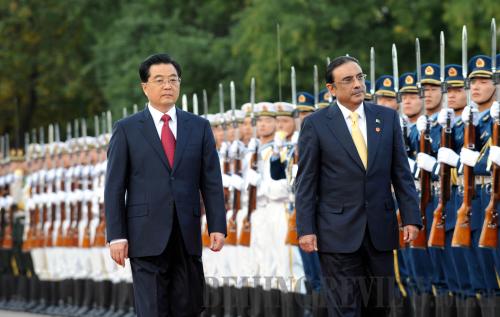|
Terrorists on the run, thawing ties with India and a budding economic recovery were among the emerging trends emphasized by Pakistani Foreign Minister Makhdoom Shah Mahmood Qureshi in an interview with Beijing Review reporter Yan Wei on February 21 at the outset of his first official visit to China. Excerpts of the interview follow:
 |
|
Terrorists with regional and global reach that once felt secure in parts of Pakistan astride its border with Afghanistan no longer view the area as a safe haven —Pakistani Foreign Minister Makhdoom Shah Mahmood Qureshi (WEI YAO) |
Beijing Review: How do you evaluate the relations between China and Pakistan?
Makhdoom Shah Mahmood Qureshi: It is an extremely valuable relationship. It was built over the years by the leadership of the two countries. But it is not restricted to the feelings of leadership. The people of Pakistan feel very strongly about China. No other country in the world can imagine the trust and confidence China enjoys in Pakistan.
What do you feel will be the highlights of China-Pakistan relations in 2010?
This is going to be an important year in our relationship. We are expecting high-level visits. The president of Pakistan is planning another visit. I'm here to reiterate the invitation to the Chinese leadership and my counterpart to visit Pakistan, because we feel these high-level visits are fruitful in that they provide us with an opportunity of following through on the decisions that have been taken. We can review things and see what needs to be done.
Then 2010 is an important year for the stability and peace of the region. It is important that the leadership of Pakistan and the Chinese leadership can share views and develop a common strategy on regional peace and stability.
 |
|
A HERO'S SALUTE: Chinese President Hu Jintao welcomes Pakistani President Asif Ali Zardari on his first state visit to Beijing on October 15, 2008 (GAO JIE) | During your trip to China, you will travel to Shanghai to visit the Pakistan Pavilion for the 2010 World Expo. What message does Pakistan want to convey to the outside world by participating in the Shanghai World Expo?
The message is very simple: Come to China. This is where it happens. This is where growth is. China is a country that is keeping the global momentum going. When there was gloom and doom in the West at a time of economic slowdown, China was able to weather the storm.
China has a beautiful mix of Western development and Eastern values that we cherish. Many people in the world have not been exposed to China. I think the fact that 70 million people are expected to visit the Shanghai World Expo means that you will have 70 million ambassadors all over the world.
How could you characterize Pakistan's progress in its fight against the Taliban?
Pakistan has made considerably good progress in the last two years. Today, the Taliban is on the run in Pakistan. International analysts and experts are of the view that many of the big names that once felt secure in Pakistan and had taken refuge in Pakistan do not consider Pakistan to be a safe haven any more. They are leaving for other destinations in other parts of the world. That is a reflection of the determination, resolve and success of our operations.
The model that we have adopted—the 3D model, that is, dialogue, development, and deterrence—is a model the world is now trying to emulate. This new comprehensive strategy—having the military surge and civilian surge go hand-in-hand—is what Pakistan has been advocating and practicing over the last couple of years with good results. Of course, we are very grateful for the help we have received from international partners.
| 